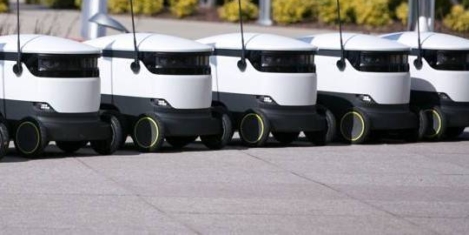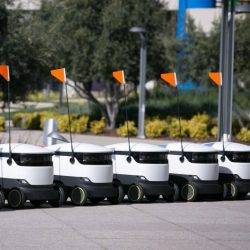May 15, 2018
People like to hold on to their smartphones even when not using them
 A large number of people walk around with their smartphones in their hands even when they are not using them, according to a new study. In the study, The Phone Walkers: A study of human dependence on inactive mobile devices, researchers Laura Schaposnik and James Unwin at the University of Illinois at Chicago studied over 3,000 adult pedestrians at six city center locations in Paris. Just over half the pedestrians were female, with an average age of about 35. Of the total adults observed, 674 were phone walkers – just over a fifth of people. The researchers noted that there were significant differences between the sexes. In total, around 20 percent of men were phone walkers, compared with 33 percent women. However, phone walking was less common in mixed couples: just 18 percent.
A large number of people walk around with their smartphones in their hands even when they are not using them, according to a new study. In the study, The Phone Walkers: A study of human dependence on inactive mobile devices, researchers Laura Schaposnik and James Unwin at the University of Illinois at Chicago studied over 3,000 adult pedestrians at six city center locations in Paris. Just over half the pedestrians were female, with an average age of about 35. Of the total adults observed, 674 were phone walkers – just over a fifth of people. The researchers noted that there were significant differences between the sexes. In total, around 20 percent of men were phone walkers, compared with 33 percent women. However, phone walking was less common in mixed couples: just 18 percent.












 Companies will need more, not less people, in the near-term to meet the demand stimulated by automation, claims a new report from ManpowerGroup. The report – Robots Need Not Apply: Human Solutions in the Skills, found that 91 percent of employers in the US will maintain or increase headcount in the next two to three years as industries shift to more advanced, automated processes. The report provides a real-time view of the impact of automation on headcount, the functions most affected and the soft skills that are both of greatest value and hardest to find. Frontline and Customer-Facing functions anticipate the most growth as organisations place higher value on customer service and human interaction. Manufacturing and Production functions are close behind. Back-office functions that are routine or add less value to customer interactions are under greatest threat as organisations implement new technology to drive efficiency. In this Skills Revolution the best blend of high-tech and high-touch will be the combination of human strengths with technical and digital know-how: 61 percent of companies say communication skills, written and verbal, are their most valued soft skill followed by customer service, collaboration and problem-solving.
Companies will need more, not less people, in the near-term to meet the demand stimulated by automation, claims a new report from ManpowerGroup. The report – Robots Need Not Apply: Human Solutions in the Skills, found that 91 percent of employers in the US will maintain or increase headcount in the next two to three years as industries shift to more advanced, automated processes. The report provides a real-time view of the impact of automation on headcount, the functions most affected and the soft skills that are both of greatest value and hardest to find. Frontline and Customer-Facing functions anticipate the most growth as organisations place higher value on customer service and human interaction. Manufacturing and Production functions are close behind. Back-office functions that are routine or add less value to customer interactions are under greatest threat as organisations implement new technology to drive efficiency. In this Skills Revolution the best blend of high-tech and high-touch will be the combination of human strengths with technical and digital know-how: 61 percent of companies say communication skills, written and verbal, are their most valued soft skill followed by customer service, collaboration and problem-solving.
 A third of UK office workers (30 percent) have admitted to only completing 1-4 tasks every day, according to a new report from Fellowes, which claims productivity levels in offices across the UK have fallen to a dramatic low. A quarter of workers admit they are unproductive for up to two hours a day, equating to a staggering 40 million-hours in lost productivity across the UK every week. Compared to data from Fellowes in 2017, the average office worker has lost an extra 30 minutes each day to productivity issues., office product specialists, released their second Productivity in the UK report today to help businesses understand what their employees need to increase output and the tools that can help. The study also found that over a third (38 percent) of office workers felt their employers weren’t doing enough to help their productivity and nearly half (40 percent) even went as far as to say they were more productive than their boss. On average Brits failed to meet deadlines at least once a week and 65 percent think a four-day working week would improve productivity.
A third of UK office workers (30 percent) have admitted to only completing 1-4 tasks every day, according to a new report from Fellowes, which claims productivity levels in offices across the UK have fallen to a dramatic low. A quarter of workers admit they are unproductive for up to two hours a day, equating to a staggering 40 million-hours in lost productivity across the UK every week. Compared to data from Fellowes in 2017, the average office worker has lost an extra 30 minutes each day to productivity issues., office product specialists, released their second Productivity in the UK report today to help businesses understand what their employees need to increase output and the tools that can help. The study also found that over a third (38 percent) of office workers felt their employers weren’t doing enough to help their productivity and nearly half (40 percent) even went as far as to say they were more productive than their boss. On average Brits failed to meet deadlines at least once a week and 65 percent think a four-day working week would improve productivity.


 Organisations are failing to get the basics right when it comes to providing the digital and virtual systems that support employees in their roles, despite an evolving technological landscape and rise in flexible working, a new report has claimed. Data released by Leesman analyses how organisations can better support employees by offering the technology tools and infrastructure that enable people to work in a flexible way. In Deloitte’s 2018 Tech Trends report issued at the beginning of 2018, there was a heightened focus on how disruptive technologies will help businesses achieve larger strategic and operational goals and drive greater value. It predicted that within the next two years, more companies will embrace the emerging ‘no-collar workforce’ trend by redesigning jobs and reimagining how work gets done in a hybrid human-and-machine environment. However, Leesman’s findings show that, as of yet, organisations are failing to get the digital basics right. According to its latest dataset (Q1 2018) 23 percent do not agree that they have the technology tools and infrastructure that enable them to work in different locations across the office or from different locations outside of the office.
Organisations are failing to get the basics right when it comes to providing the digital and virtual systems that support employees in their roles, despite an evolving technological landscape and rise in flexible working, a new report has claimed. Data released by Leesman analyses how organisations can better support employees by offering the technology tools and infrastructure that enable people to work in a flexible way. In Deloitte’s 2018 Tech Trends report issued at the beginning of 2018, there was a heightened focus on how disruptive technologies will help businesses achieve larger strategic and operational goals and drive greater value. It predicted that within the next two years, more companies will embrace the emerging ‘no-collar workforce’ trend by redesigning jobs and reimagining how work gets done in a hybrid human-and-machine environment. However, Leesman’s findings show that, as of yet, organisations are failing to get the digital basics right. According to its latest dataset (Q1 2018) 23 percent do not agree that they have the technology tools and infrastructure that enable them to work in different locations across the office or from different locations outside of the office.


















May 1, 2018
No surprises in new report on future workplace trends
by Mark Eltringham • Comment, Flexible working, Technology, Wellbeing, Workplace design
More →